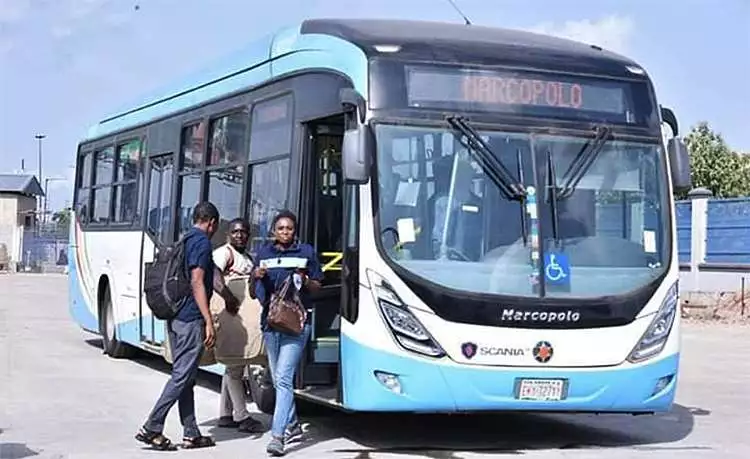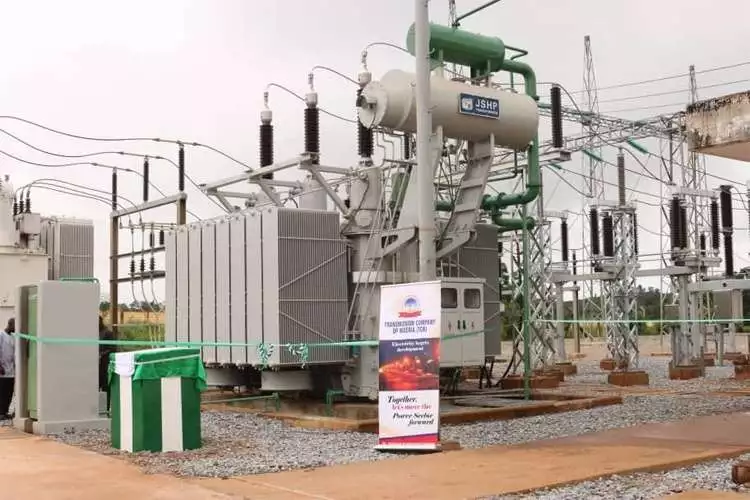The recent disclosure by Primero Transport Over ageing, unavailability of Spare Parts and CBN’s Forex Policy hampering services rendered brings to fore the FG’s Automotive Domestication Policy, as LAMATA Urges Commuters To Remain Calm
By Akinwale Kasali
Anxiety and fear is the order of the day among commuters of the Bus Rapid Transit, BRT.
This is as result of the disclosure by Fola Tinubu, Managing Director of Primero Transport Services Limited, operators of the Lagos Bus Rapid Transport, that the service rendered by the Company could be hampered by the Central Bank of Nigeria’s, (CBN) failure to make available forex to import essential parts for their buses.
Over the week, Tinubu lamented that the price of vehicle parts imported within the last eight months by the firm had increased with about N400 million and that it has even become impossible to get the parts due to the apex bank’s policy.
The challenge, he claimed, is having a toll on the operators who are finding it difficult to provide essential service to commuters because they could no longer refurbish old and faulty buses. The services, also, face a challenge from the State government which tries to control fares commuters pay for BRT services. He noted that inflation is eaten up into operators’ revenue who are struggling to remain in business.
Commuters of the popular BRT are set to face hard times, following this lamentation by its operators of unavailability of Foreign Exchange, Forex, to import essential parts of the buses that needs repair.
Failure of these buses to work optimally will affect millions of commuters in Lagos State who prefer taking these buses due to its comfort and cost effectiveness. This will give room for Commercial bus owners to milk commuters by hiking fares.
However, reacting to this disclosure and putting away fears and anxiety from commuters and Lagosians, the Lagos State Metropolitan Area Transport Authority, LAMATA, the regulatory body for transportation in Lagos, through its Media Officer, Kola Ojelabi, said that Primero is yet to write LAMATA officially, stating their present challenge.
“The Management of Primero have not written LAMATA, that is the regulatory body of transportation, stating this challenges, nevertheless, in any situation, LAMATA is assuring Commuters not to be scared or alarmed by the latest development, LAMATA has Plan B on ground to address he situation. But I am stating emphatically that we are to be briefed by Primero about this development”, Ojelabi said.
Corroborating Ojelabi, the Ministry of Transportation headed by the Commissioner for Transport, Frederick Olarinde, also claimed not to have received any formal letter written to the Ministry by the Primero Transport Service Management.
The Media department of the Ministry told this news medium that they are yet to officially inform of this development by the affected transport service.
A visit to the Majidun Head Office Depot of Primero Transport Service to have a chat with the Head, Corparate Communication, Mutiu Yekeen, on the issue at hand, and to know what the Organization is doing was of no use.
He was said not to be on seat, and would not like to speak to the Media as regards this, stressing that the MD has already spoken on behalf of the Organization.
Speaking with commuters, they lamented that if the issue raised by Primero Transport Service is not addressed in earnest, it will spell doom for commuters and make mobility difficult.
Ade Muyiwa, a media practitioner, who often times boards the BRT buses to the Island says commuters will be hugely affected with this development.
Muyiwa said he prefers boarding the BRT bus to driving his personal car because it saves fuel consumption, payment of parking space and levies from Local Government officials on Cars.
In the same vein, Jide Johnson, the immediate past deputy Provost of the Nigerian Institute of Journalism, NIJ, is of the opinion that if the BRT operators should go out of business, it will be hell for commuters and leads to traffic congestion in the State.
He added that, “The BRT operators are yet to cover the length and breadth of Lagos. They don’t have enough buses to convey Lagosians to their respective destination, yet, they are contemplating of going out business due to the aforementioned reasons. The Governor Babajide Sanwo-Olu led government needs to come to the rescue of commuters in the state, because this will spell doom in terms of transportation”.
This, however, brings to fore the Federal Government’s domestication policy, which announced the introduction of the automotive policy which was geared towards discouraging the importation of wholly assembled automobiles and encouraging local manufacturing.
This policy by the FG specifically allows Local Assembly plants to import completely-knocked-down vehicles at 0% duty, and semi-knocked-down vehicles at 5% duty, while importers pay a 70% duty on new and previously-owned vehicles. And also, to encourage local car production/assembly plants while cutting importation through raising import duties.
No doubt, the automotive industry plays both strategic and catalytic roles ranging from employment creation, fostering the development of small and medium enterprises in respect of automotive parts and components, improving industrial linkages and facilitating investment in technology and innovation
Years down the line, the policies enacted by the FG have failed to achieve the desired outcomes as the country’s domestic vehicle production capacity, which remains underutilized, raising questions on what has happened to this policy.
Johnson delved into the FG Domestication Policy which he said hasn’t yielded any good fortunes for the automobile industry, which he said is affecting the stakeholders in the industry.
He pointed out that if Primero Transport Service had patronized and gotten their buses from Innoson Motors in Nigeria, the issues raised by the Company wouldn’t have come into play.
“The government has failed and is merely playing lip service to the policy. If FG had given local manufacturers in this industry to thrive with its policy, we wouldn’t be where we are now”, he stated.
It would be recalled that that the Chairman of Peugeot Automobile Nigeria, PAN, Aliyu Wadada, on Channels Television weeks back, described the level of growth of Nigeria’s automobile industry as shameful.
He condemned government policies that he described as impeding the growth of the Nigerian automobile industry.
“The automobile sector in Nigeria should have gone way beyond where it is. It is shameful enough that we have still haven’t gotten to manufacturing which is greatly about the environment that we operate in,” Wadada said.
Wadada had queried the Minister of Finance, Budget, and National Planning, Zainab Ahmed on her position on the reduction in the tariff on imported vehicles as stated in the Finance Act 2020.
Ahmed had further stressed back then there was a 35% tariff and 35% levy which now all together makes 70%. The reduction in the Finance Act 2020, it becomes to 40% and the 40%, Wadada says it is not good enough for the local assembly plants to thrive or develop because it gives a differential of 30%.
“That 30% has always been there even before this policy but it never attracted investors because it is not good enough for investors to be attracted, so that 40% differential is not good enough for local assembly plants to develop,” Wadada said.
Innoson Vehicle Manufacturing Co. Ltd, also known as IVM, is a Nigerian automobile and bus manufacturing company. It was founded by Chief Innocent Chukwuma Nwala and runs a plant in Nnewi in the state of Anambra. Innoson Vehicle Manufacturing is nicknamed Pride of African Road.
70% of the car parts are produced locally while the rest is sourced from Japan, China, and Germany.
Among IVM’s vehicle models are the five-seater Fox (1.5-litre engine) and Umu (2-litre engine) as well as the mini-bus Uzo. Innoson vehicles have its global presence felt and it has been used in some West African countries like: Mali, Sierra Leone and Ghana. Sadly, it faces neglect from Nigerians, who prefer importation of vehicle parts.
Out of the numerous makers of cars and buses, only Eight companies have an assembling plant in Nigeria, with three out of the Eight being indigenous, including Innoson Motors.
Peugeot Nigeria was one of the first companies to start full local production of cars in Nigeria far back in the 1980, while Hyundai announced that it wanted to start its local assembly of Hyundai cars in Nigeria under Globe Motors which is the biggest distributor of Hyundai cars in Nigeria
Dana motors, the biggest distributor of Kia Motors in Nigeria, also has a local automobile assembling plant that produces major Kia vehicles like the Kia Rio.
Others are Coscharis Motors, the biggest distributor of BMW, Land Rover, Rolls-Royce and Ford cars in Nigeria. It completed its assembly plant for Ford vehicles in 2018 with plans to produce between 10,000 to 20,000 cars there every year.
Nissan started its local production of cars in 2014 starting with the Nissan Patrol SUV. The Nissan Almera and the Nissan NP300 are two vehicles that have been consistently locally produced here in Lagos
Nissan was the first automaker to move in alignment with Nigeria’s new automobile policy because Stallion Motors know that the demand for brand-new cars in Nigeria grows every year and it will only be profitable to the country and the company.
For the locally produced cars and plants in Nigeria, aside, Innoson Motors, the first-ever fully Nigerian company that went into the production of automobiles, Nord Automobiles is a Nigerian automotive manufacturer with headquarters in Lagos, Nigeria, owned by Ajayi Joshua Oluwatobi.
Lanre Shittu Motors started its JAC Truck assembly plant in 2018 as a way to make heavy-duty trucks cheaper for Nigerian users. The plant has the capacity to manufacture 6 units of trucks in one shift or 12 in two shifts depending on the market demand and can produce about 150 vehicles monthly.
Recall that the first phase of the Lagos BRT was opened in 2008. The initiative to build the system was initiated by the government under Governor Bola Ahmed Tinubu administration. It goes from Mile 12 through Ikorodu Road and Funsho Williams Avenue up to CMS then.
According to LAMATA, it catered for the mobility of over 200,000 commuters on a daily basis when it started operation. The operation was franchised to the 1st BRT Cooperatives, an arm of the National Union of Road Transport Workers, Lagos Chapter.
The system commenced operations with 220 buses that runs from 6.00 a.m. to 10 p.m. daily and moved more than 200,000 passengers daily. The system in the first 4 years of operation had moved more than 220 million passengers. Presently, over 250 million board the BRT annually.
The emergence of Primero Transport Services Limited as the sole transport operators of the BRT came into being under the leadership of immediate past Governor Akinwunmi Ambode, commencing operations on approved routes with 434 Yutong high capacity buses.
On the board of the Management of Primero is Ademola Seriki, a renowned Politician, is the Chairman of the board, Fola Tinubu as Managing Director, Francis Obi as Executive Director.
Others are; Ibrahim Bisallah, Yemi Adefaran, Dayo Orimoloye and Raheem Owodeyi are all the Directors in the Organization.
Over the years, the number of buses rolled out has been on the increase and based on customers’ demand, with a state of the art and ultra-modern equipment for the maintenance workshop, automated bus wash facility, fuel storage facility, administrative offices; other facilities include a mini depot at the Mile-12 terminal and a maintenance workshop at our Ojota depot.
Primero is the sole operator of the Ikorodu to TBS corridor, with additional routes to Ikeja, Oshodi and Yaba. We also operate along the Oshodi to Abule-Egba BRT corridor, with it services run all day, seven days a week.





